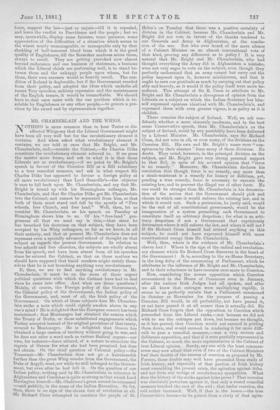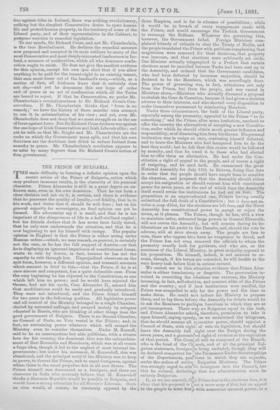MR. CHAMBERLAIN AND THE WHIGS.
NOTHING is more common than to hear Tories or dis- affected Whigs say that the Liberal Government might have been all very well but for the revolutionary element it contains. And when asked what revolutionary element it contains, we are told at once that Mr. Bright, and Mr. Chamberlain, and,—outside the Cabinet,—Sir Charles Dilke constitute the revolutionary element referred to. If we press the matter more home, and ask in what it is that these Liberals are so revolutionary,—if we point to Mr. Bright's speech in favour of the Coercion Bill as a Bill subsidiary to a true remedial measure, and ask in what respect Sir Charles Dilke has appeared to favour a foreign policy at all more revolutionary than Lord Granville's—the objector is sure to fall back upon Mr. Chamberlain, and say that Mr. Bright is bound up with his Birmingham colleague, Mr. Chamberlain, and that Sir Charles Dilke got Mr. Chamberlain into the Cabinet, and cannot be separated from him, so that both of them must stand and fall by the apostle of "Free schools, free Church, and free land." Well, then, let us consider Mr. Chamberlain, as his speech on Tuesday at Birmingham shows him to us. Of his " free-land" pro- gramme all that we need say is this,—that since he has broached his doctrines on that subject, they have been accepted by his Whig colleagues, so far as we know, in all their entirety, and that at present Mr. Chamberlain does not represent even a specially advanced school of thought on that subject as regards the present Government. In relation to free schools and free churches, the subjects are wholly absent from his speech, and have been absent from all his speeches since he entered the Cabinet, so that on these matters we should have supposed that timid croakers might satisfy them- selves that he is not broaching anything very revolutionary.
If, then, we are to find anything revolutionary in Mr. Chamberlain, it must be on the score of those urgent political questions with which the Cabinet have had to deal since he came into office. And what are these questions ? Mainly, of course, the Foreign policy of the Government, the Colonial policy of the Government, the Indian policy of the Government, and, most of all, the Irish policy of the Government. On which of these subjects does Mr. Chamber- lain strike a note which could rightly awaken alarm in any one's mind ? He is delighted that the European concert has been maintained ; that Montenegro has obtained the cession which the Treaty of Berlin, or those substituted engagements which Turkey accepted instead of the original provisions of that treaty, secured to Montenegro. He is delighted that Greece has obtained a large cession of territory without going to war, and he does not utter a word such as various Radical organs—our own, for instance—have uttered, of a nature to stimulate the regrets of Greece for what she had been promised but does not obtain. On the chief question of Colonial policy—the Transvaal—Mr. Chamberlain does not go a hairsbreadth further than the great Whig seceder from the Government, the Duke of Argyll, went, not while he still belonged to the Govern- ment, but even after he had left it. On the question of our Indian policy, nothing said by Mr. Chamberlain in reference to Afghanistan and Candahar is quite as strong as that which Lord Hartington himself—Mr. Gladstone's great second-in-command —.said publicly, in the name of the Indian Executive. So far, then, there is no sign of the cloven foot of revolution at all. Sir Richard Cross attempted to convince the people of St. Helen's on Tuesday that there was a positive certainty of division in the Cabinet, because Mr. Chamberlain and Mr. Bright did not vote in favour of the thanks tendered to our Generals and Army in Afghanistan, at the conclu- sion of the war. But who ever heard of the mere silence of a Cabinet Minister on an almost conventional vote of that kind, proving any difference as to policy I It is very natural that Mr. Bright and Mr. Chamberlain, who had thought everything the Army did in Afghanistan a mistake, were not very eager to vote on the subject, even though they perfectly understand that an army cannot but carry out the policy imposed upon it, however mischievous, and that it ought to earn our gratitude as much by carrying out that policy ably and bravely, as it would if the policy itself were more be- neficent. This attempt of Sir R. Cross to attribute to Mr. Bright and Mr. Chamberlain a divergence of opinion from the Liberals on a subject on which the Indian Secretary has him- self expressed opinions identical with Mr. Chamberlain's, and expressed them with even greater vigour, is as paltry as it is childish.
There remains the subject of Ireland. Well, we ask con- fidently whether a more sincerely moderate, and in the best sense Conservative speech, than Mr. Chamberlain's on the subject of Ireland, could by any possibility have been delivered by a Liberal Minister. Mr. Chamberlain, says. Sir Richard Cross, did not vote in all, or even ninny, of the divisions on the Coercion Bill. His own and Mr. Bright's name were " con- spicuous by their absence " from many of those divisions. No doubt. They voted, however, in the principal division on the subject, and Mr. Bright gave very strong personal support to that Bill, in spite of his avowed opinion that " force is no remedy." Moreover, Mr. Chamberlain declares his conviction that though force is no remedy, any more than a strait-waistcoat is a remedy for lunacy or delirium, yet, pending a true remedy, force is necessary to execute the existing law, and to prevent the illegal use of other force. No one could be stronger than Mr. Chamberlain in his denuncia- tion of the notion that the Government should pick and choose in which case it would enforce the existing law, and in which it would not. Such a pretension, he justly said, would be the end of all constitutional government, would be the inauguration of a system permitting each Government to constitute itself an arbitrary despotism ; for what is an arbi- trary despotism if not a Government that capriciously determines where it will enforce the law, and where it will not I If Sir Richard Cross himself had uttered anything on this subject, he could not have expressed himself with more constitutional energy than Mr. Chamberlain.
Well, then, where is the evidence of Mr. Chamberlain's cloven foot ? Where is the sign of the radical and revolution- ary element which Sir Richard Cross discovers in the heart of the Government ? It is, according to the ex-Home Secretary, in the long delay of the summoning of Parliament, which he attributes to the influence of Mr. Bright and Mr. Chamberlain, and to their reluctance to have recourse once more to Coercion.
Now, considering the severe opposition which Coercion encountered in the House of Commons even in January, after the various Irish Judges had all spoken, and after we all knew that outrages were multiplying rapidly, it seems to us perfectly certain that a Parliament summoned in October or November for the purpose of passing a Coercion Bill would, in all probability, not have passed it, or not have passed it at all sooner than it actually did. Sir Richard Cross forgets that the opposition to Coercion which proceeded from the Liberal ranks,—not because we did not wish to see the outrages put down, but because we thought, as it has proved, that Coercion would not succeed in putting them. down, and would succeed in rendering it far more diffi- cult to pass a remedial measure,—was a very serious and deliberate opposition, and that if it were partially represented in the Cabinet, so much the more representative is the Cabinet of true Liberal opinion. Surely, any one with the least common- sense may now admit that oven if two of the Cabinet Ministers had their doubts of the success of coercion as proposed by Mr. Forster, those doubts may well have proceeded from study of Irish history, and especially of that portion of Irish history most resembling the present crisis, the agitation against tithe, and not from any vestige of revolutionary sympathies. What does the history of the strike against tithe prove ? That coercion was absolutely powerless against it, that only a sound remedial measure touched the root of the evil ; that under coercion, the evil rather increased. Well, if that is the lesson—the true Conservative lesson—to be gained from a study of that agita- Lion against tithe in Ireland, there was nothing revolutionary, nothing but the simplest Conservative desire to spare human life and protect human property, in the tendency of some of the Liberal party, and of their representatives in the Cabinet, to postpone coercion to remedial legislation. To our minds, Sir Richard Cross, and not Mr. Chamberlain, is the true Revolutionist. He declares the remedial measure stow proposed and accepted in its main outlines by many of the xnost Conservative and most deeply-interested landowners in Ire- land, a measure of confiscation, which all who denounce confis- cation ought to resist. He does not give the smallest evidence for this opinion, except his own ipse dixit that if you allow anything to be paid for the tenant-light to an existing tenant, that sum must come out of the landlord's rent,—which, as a matter of fact, all Irishmen know that it certainly does not •do,—and yet he denounces this one hope of order and of peace as an act of confiscation which all the Tories are bound to reject. If that be Conservative, we prefer Mr. Chamberlain's revolutionariness to Sir Richard Cross's Con- servatism. If Mr. Chamberlain thinks that " force is no remedy," we have the history of three months' vain attempt to use it in substantiation of his view ; and yet, even Mr. Chamberlain does not deny that we must struggle on in the use of force against force. But Sir Richard Cross declares war against the one hope of Irish Conservatives and Irish Liberals alike; and yet he tells us that Mr. Bright and Mr. Chamberlain are the rocks on which the Government must split, and that his own doctrines are the doctrines best fitted to reduce Ireland from anarchy to peace. Mr. Chamberlain's revolution appears to us safer by many degrees than Sir Richard Cross's notion of firm government.





























 Previous page
Previous page